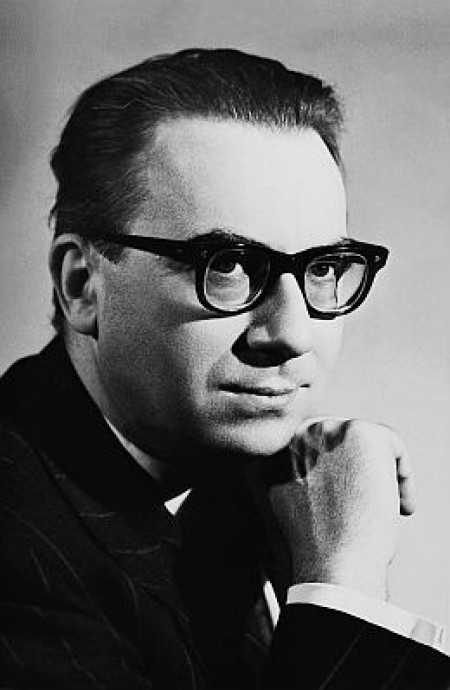
6 February 1925, Kaposvár – 31 January 1993, Budapest
Ernő Lendvai was one of the most important Hungarian music theoreticians in the 20th century. He was an original thinker, a system-creator and a tireless researcher into the internal laws of music. In the last part of his life he worked on a large-scale computerised research project, progressing towards new discoveries; his work, however, was brought to an end by his sudden death in January, 1993.
Lendvai was one of those rare scholars who are also first-class musicians. He had the gift of perfect pitch, as well as instrumentalist talent. From the end of the war he studied with György Kósa and István Antal in the piano department of the Music Academy, gaining a diploma in 1949. Thanks to his first class pianistic abilities and his legendary musical memory, he could play a large part of the music literature without a score. He worked as a teacher and headmaster in Szombathely, Győr and Szeged, as a musical director at Hungarian Radio, and was later a senior fellow of the Educational Research Institute.
Ernő Lendvai's name became known worldwide primarily through his researches into Bartók's music. He began working on the systematic analysis of the Bartókian sound system just a few years after Bartók's death, while still a student at the Music Academy, when the composer's work was known only to a narrow professional audience. By his discovery of Bartók's system of function ("axis system") and his creation of harmonies ("alpha" type accords), the golden section phenomena (Fibonacci-line), manifesting themselves in the characteristic note-rows ("model" scales) and in the proportions of the whole construction, Lendvai created a unified and clear analytic method for approaching Bartók's music (Bartók stílusa - Bartók's style, 1955; Bartók dramaturgiája – Bartók's dramaturgy, 1964; Bartók költői világa – Bartók's poetic world, 1971). His books appeared in foreign languages as well, thus making him internationally know.
The Bartók research, however, is only one part of Lendvai's enormous life's work. His exceptional intellect cast a light on the whole of musical history and brought impressive results in the analysis of 19th century music, particularly as regards the works of Verdi and Wagner. The whole of Italian culture, and within that the art of Toscanini and Verdi, played a central part among Lendvai's interests. His Aida analyses, and afterwards his complete, comprehensive analysis of the tonal dramaturgy of Falstaff, reveal the entire system of interconnections. Besides Verdi, in a way that is both expected and unexpected, Richard Wagner played an important role in Lendvai's work. Similarly to the interpretation of the late Verdi style, the analysis of Tristan and Parsifal also depicts these master works as precursors of the 20th century, integral parts of the move of the sound system from the heptatonic scale towards the twelve-tone scale. Of the planned trilogy only one volume was completed. It was published in English in 1988, under the title, Verdi and Wagner.
Lendvai engaged in an intensive study of the harmonic world of Kodály's music from the 1970's onwards. (The world of harmonies of Bartók and Kodály, 1974; The Workshop of Bartók and Kodály, 1983) It was, however, only later that the relative sol-fa linked to Kodály's principles, as an analytic tool, brought revealing results in Lendvai's thinking. The sol-fa terms, extended to the 12 tones, the functional content of the raised or lowered sounds (that is, their relations to the tonic centre), provide semantic guidance in the study of late romantic language condensed with chromatics.
Lendvai did not have a permanent teaching post at the Music Academy; he gave occasional lectures, a term at a time, to the students of the musicology department. His publications often evoked professional debates, controversies. As with every closed theoretical system – such as Schönberg's and Schenker's – his work evoked opposition from those holding different ideas. This, however, does not diminish the inherent greatness and significance of his concepts.
Ernő Lendvai received the title, Doctor of Music, in 1986. In 1992 he was awarded the Széchenyi Prize. His last completed work is the analysis of the "Sprecher" scene in The Magic Flute.
K. K.


